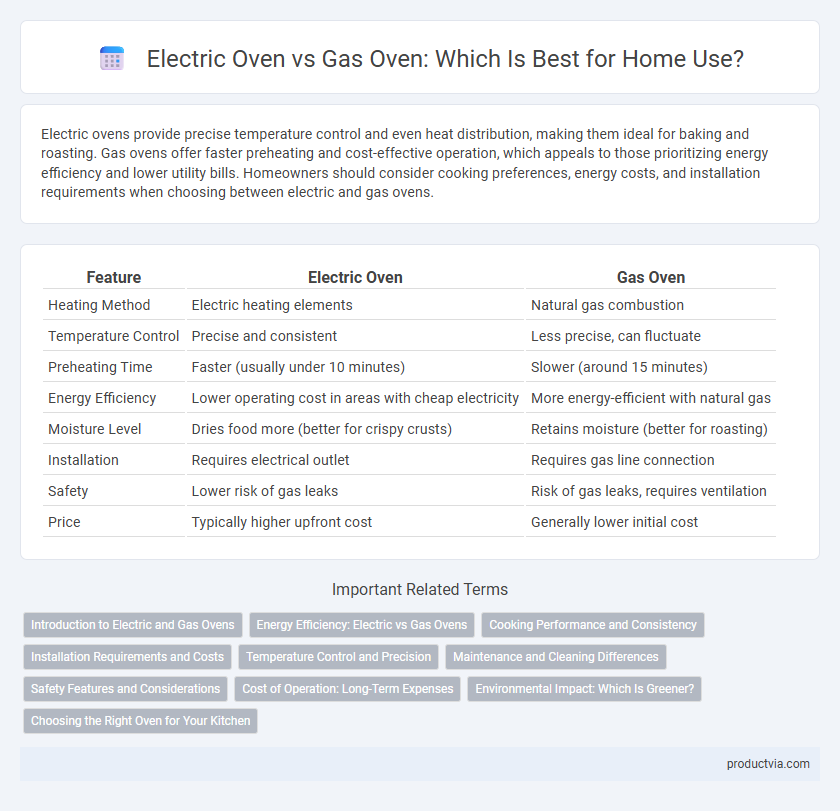Electric ovens provide precise temperature control and even heat distribution, making them ideal for baking and roasting. Gas ovens offer faster preheating and cost-effective operation, which appeals to those prioritizing energy efficiency and lower utility bills. Homeowners should consider cooking preferences, energy costs, and installation requirements when choosing between electric and gas ovens.
Table of Comparison
| Feature | Electric Oven | Gas Oven |
|---|---|---|
| Heating Method | Electric heating elements | Natural gas combustion |
| Temperature Control | Precise and consistent | Less precise, can fluctuate |
| Preheating Time | Faster (usually under 10 minutes) | Slower (around 15 minutes) |
| Energy Efficiency | Lower operating cost in areas with cheap electricity | More energy-efficient with natural gas |
| Moisture Level | Dries food more (better for crispy crusts) | Retains moisture (better for roasting) |
| Installation | Requires electrical outlet | Requires gas line connection |
| Safety | Lower risk of gas leaks | Risk of gas leaks, requires ventilation |
| Price | Typically higher upfront cost | Generally lower initial cost |
Introduction to Electric and Gas Ovens
Electric ovens use electrical resistance to generate heat, offering precise temperature control and even cooking results, ideal for baking and roasting. Gas ovens rely on natural gas or propane combustion, providing quicker heat-up times and moist heat that helps retain food moisture. Homeowners often choose electric ovens for consistent baking performance, while gas ovens appeal to those who prioritize rapid heating and lower operational costs.
Energy Efficiency: Electric vs Gas Ovens
Electric ovens typically offer higher energy efficiency compared to gas ovens due to better heat retention and precise temperature control through electrical heating elements. Gas ovens often experience heat loss during combustion and venting, which can reduce overall energy effectiveness in home cooking. Homeowners aiming to minimize energy consumption often prefer electric ovens for their consistent performance and reduced utility costs.
Cooking Performance and Consistency
Electric ovens provide precise temperature control and even heat distribution, resulting in consistent cooking performance ideal for baking and roasting. Gas ovens offer faster heat responsiveness and higher humidity levels, which can enhance flavor but may lead to uneven cooking. Home cooks seeking reliability and uniform results often prefer electric ovens for their stability and accuracy in temperature maintenance.
Installation Requirements and Costs
Electric ovens require a dedicated electrical circuit, typically 240 volts, with straightforward installation in homes equipped with compatible wiring, resulting in moderate setup costs. Gas ovens need a natural gas line connection and proper ventilation, which can increase installation complexity and expenses, especially if gas lines are not already present. Overall, electric ovens tend to have lower installation costs and fewer safety concerns compared to gas ovens.
Temperature Control and Precision
Electric ovens provide superior temperature control with precise digital thermostats that maintain consistent heat levels, ideal for baking and delicate cooking tasks. Gas ovens often experience temperature fluctuations due to open flame variability, making precise temperature maintenance more challenging. Home cooks prioritizing accuracy and stable conditions typically prefer electric ovens for their reliable and even heat distribution.
Maintenance and Cleaning Differences
Electric ovens feature smooth, flat cooking surfaces and fewer internal components, making them easier to clean and maintain by wiping down racks and trays regularly. Gas ovens often require more frequent maintenance due to burner cleaning, pilot light adjustments, and occasional gas line inspections to ensure safety. While electric ovens are generally considered low-maintenance, gas ovens may demand professional servicing to address combustion-related issues and maintain optimal performance.
Safety Features and Considerations
Electric ovens offer enhanced safety features such as automatic shut-off timers and cool-to-touch doors, reducing the risk of burns and fire hazards in home use. Gas ovens require proper ventilation and regular maintenance to prevent carbon monoxide leaks, which pose significant health risks. Homeowners should consider the presence of advanced safety sensors and compliance with safety standards when choosing between electric and gas ovens.
Cost of Operation: Long-Term Expenses
Electric ovens typically have higher energy costs due to electricity rates, making their long-term operation more expensive compared to gas ovens. Gas ovens use natural gas, which is often cheaper per unit of energy, resulting in lower monthly utility bills over time. Maintenance expenses for gas ovens may be higher because of the need for regular safety inspections and potential repairs to gas lines.
Environmental Impact: Which Is Greener?
Electric ovens produce lower direct emissions compared to gas ovens, making them a cleaner option in household cooking when powered by renewable energy sources such as solar or wind. Gas ovens rely on natural gas combustion, releasing carbon dioxide and methane, which contribute to greenhouse gas emissions and indoor air pollution. Lifecycle analyses show that electric ovens paired with sustainable electricity grids have a significantly smaller carbon footprint than gas ovens, highlighting their environmental advantage for eco-conscious consumers.
Choosing the Right Oven for Your Kitchen
Electric ovens offer precise temperature control and even heat distribution, making them ideal for baking and roasting with consistent results. Gas ovens provide faster heating and are often preferred for broiling, with lower operational costs due to natural gas pricing. Selecting the right oven depends on your cooking style, kitchen setup, and energy availability to maximize efficiency and performance in daily use.
Electric oven vs Gas oven for home use Infographic

 productvia.com
productvia.com